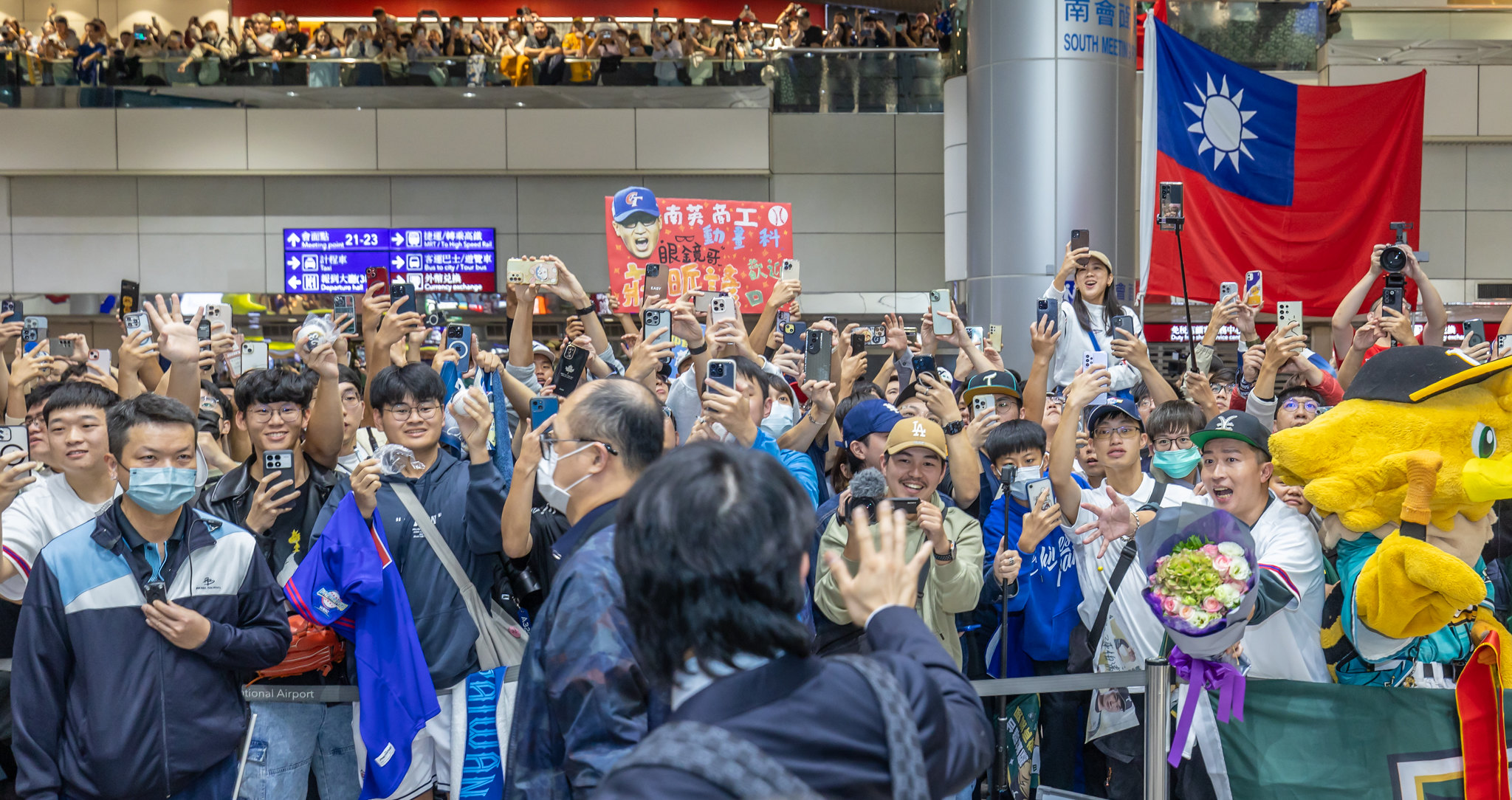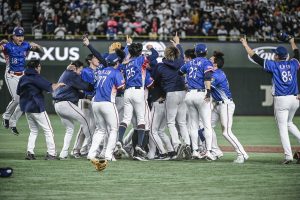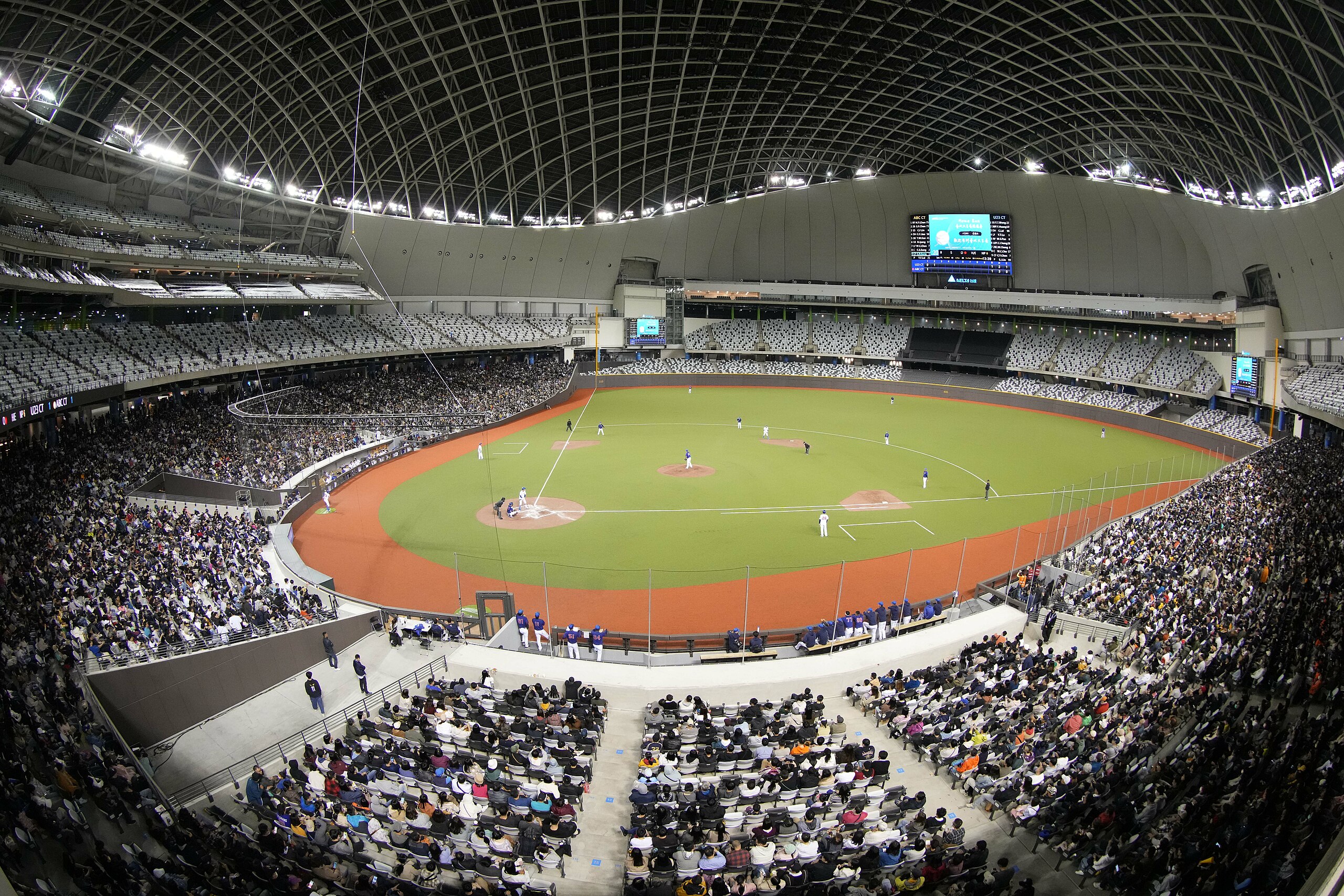The past two weeks have marked a glorious and historic chapter for Taiwanese baseball. First, the island’s national team outperformed several baseball powerhouses at Taipei Dome, which co-hosted the Opening Round of the World Baseball Softball Confederation (WBSC) Premier12. Finally, Taiwan triumphed over the United States and Japan in the Super Round and final at Tokyo Dome. With an unprecedented victory over Samurai Japan on November 24, Team Chinese Taipei – commonly known as Team Taiwan – clinched its first-ever title in one of the highest-level international baseball competitions, alongside the Olympics and the World Baseball Classic (WBC).
This outcome surprised many baseball pundits and fans alike. Despite baseball’s status as Taiwan’s national pastime, most did not expect the team to even reach the Super Round of the tournament, let alone shut out Samurai Japan 4-0 and end Japan’s 27-game winning streak on the global stage. Taiwan had only finished ninth in the inaugural Premier12 in 2015 and fifth in the 2019 edition. In the WBC, the team placed 14th in 2017 and 17th in 2023, though it achieved an eighth-place finish in 2013, narrowly losing Japan in the second round in a game that went to extra innings.
Notably, the last time Taiwanese baseball came close to a first-place finish was over three decades ago at the 1992 Barcelona Olympics, where the team secured a silver medal after falling to Cuba in the final.
This underdog image can also be attributed to the team’s roster. Due to injuries and contract restrictions, many Taiwanese players who are or have been part of professional teams in the United States and Japan were unavailable for the tournament. One notable absence was former Major League Baseball (MLB) player Yu Chang, who delivered timely home runs for Taiwan during the 2023 WBC but has been focusing on treating his left-hand injury during his first season at Taiwan’s Chinese Professional Baseball League (CPBL). Of the 28 players on the roster, only two – pitching prospect Lin Yu-min and catcher Lyle Lin – were from the Arizona Diamondbacks’ minor league network. The remainder of the team consisted entirely of top players from the CPBL.
Before the tournament, many Taiwanese fans doubted the coaching staff’s selections and questioned the team’s ability to compete against professional players from Nippon Professional Baseball (NPB), the Korea Baseball Organization (KBO), and MLB systems.
Yet the Taiwan teams collectively defied the pessimism and skepticism. On the mound, Taiwan’s pitchers posted a remarkable 1.80 team ERA over five games in the Opening Round – the lowest among the 12 teams – compared to Venezuela’s 2.36, the United States’ 2.41, Japan’s 2.80, and South Korea’s 4.81. The fielders also contributed numerous defensive gems that disrupted their opponents’ momentum.
Offensively, the batters hit six home runs in the Opening Round and four more in the Super Round, including Chen Chen-wei’s pivotal grand slam against South Korea in the first game and Chen Chieh-hsien’s commanding three-run shot against Japan in the final. Notably, the latter Chen, Taiwan’s captain, recorded an extraordinary .625 batting average over the tournament’s nine games, earning him the Most Valuable Player title and significantly enhancing his visibility outside Taiwan.
Many have attributed the players’ outstanding performance to Taiwan’s manager Tseng Hao-jiu and his coaching and scouting staff, praising their exceptional intelligence gathering, lineup adjustments, and in-game decisions.

Taiwanese baseball fans greet the victorious members of the Chinese Taipei baseball team at at the airport in Taipei, Taiwan, Nov. 25, 2024. Official Photo by Wang Yu Ching / Office of the President. ROC (Taiwan).
Taiwan’s astonishing success in the Premier12 is a testament to the improvement and progress that the CPBL has made in recent years. The league has just completed its 35th season on a high note, excelling in both game quality and ticket sales. This year marked the first time in over a decade that the league returned to six major teams: the CTBC Brothers, Fubon Guardians, Rakuten Monkeys, TSG Hawks, Uni-President 7-Eleven Lions, and Wei Chuan Dragons. These teams have also established highly competitive minor league programs, incentivizing players to train diligently and remain disciplined as they work their way up. Furthermore, the recruitment of foreign players has arguably become more selective, as evidenced by the fact that several represented their national teams in this year’s Premier12 tournament.
The last time the league had six teams competing was in 2008, but game-fixing scandals reduced the league to four teams and caused a significant drop in popularity. Average attendance per game plummeted to just 1,900 in 2008 but rebounded to 6,100 following Taiwan’s respectable performance in the 2013 WBC. Since then, attendance has stabilized between 5,000 and 6,000, except during the 2020-2022 seasons, which were impacted by the COVID-19 pandemic. In 2024, however, attendance surged by 28 percent year-over-year to approximately 7,700 per game across 360 games, generating total ticket revenue of NT$1.1 billion (US$34 million). Many have attributed this resurgence to the vibrant cheerleading and chanting culture, which has drawn families and photographers to the ballparks, creating a festive atmosphere that appeals to fans of all ages.
However, the most paradigmatic shift in Taiwan’s baseball landscape is arguably the opening of the 40,000-capacity Taipei Dome. Despite its long and challenging journey since the plan’s inception in 1991, the island’s first baseball dome finally came to fruition, opening its doors to teams and fans during the Asian Baseball Championship in December 2023.
In the 2024 CPBL season – the first season in which the Taipei Dome hosted CPBL games – a total of 38 games were played there, with an average attendance of approximately 20,000 per game. All six CPBL teams utilized the Taipei Dome as a home venue at various points, benefiting significantly from playing in the state-of-the-art facility. These benefits included enhanced player experience in a world-class stadium, the elimination of costs and disruptions caused by rain delays, and increased ticket and merchandise revenue, enabling teams to reinvest in recruiting talent both locally and internationally.
In addition to elevating the quality of games, player performance, and fan experience in the CPBL, the Taipei Dome is poised to host more international tournaments, as it did during the Opening Round of the Premier12. Beyond offering a home-field advantage in major events, the dome also creates opportunities to invite world-class teams to Taiwan for games, whether friendly matches or formal competitions. For instance, in February 2024, the Yomiuri Giants played two exhibition games at the Taipei Dome, and there are reports that Taiwan is exploring opportunities with MLB to include the venue in its World Tour in the near future.
Earlier this year, MLB successfully held its Seoul Series at the Gocheok Sky Dome, which has a capacity of 16,800 for baseball. Given the Taipei Dome’s significantly larger capacity, combined with Taiwan’s passion for baseball, it is likely that organizations such as MLB, NPB, KBO, and WBSC will show greater interest in hosting events there. Such developments would significantly benefit Taiwan’s professional baseball ecosystem.
Taiwan’s triumph in the Premier12 and the spectacular games held at both the Taipei Dome and Tokyo Dome have brought immense joy to the nation. Riding this wave of momentum, we can anticipate even more fans filling the stands during next year’s CPBL season, further strengthening the league’s competitiveness and overall environment. Looking ahead, however, the sustainability of the national team remains a crucial consideration. Whether Team Taiwan can adopt a more institutionalized model, similar to Samurai Japan, is a question that CPBL President Tsai Chi-chang and Chinese Taipei Baseball Association President Jeffrey Koo Jr. must carefully evaluate.
Baseball is one of the few things that unites Taiwanese people across different backgrounds and political divides. Several political leaders are passionate baseball fans, such as Taiwanese President Lai Ching-te, who supports the Lions; Taichung Mayor Lu Shiow-yen, a Brothers fan; and Taipei Mayor Chiang Wan-an, who cheers for the Dragons. With their support and the enthusiasm of the public, Taiwan’s professional baseball teams and infrastructure can continue to grow stronger. This would not only serve as an invaluable asset for Taiwan but also contribute positively to the global baseball community.


































